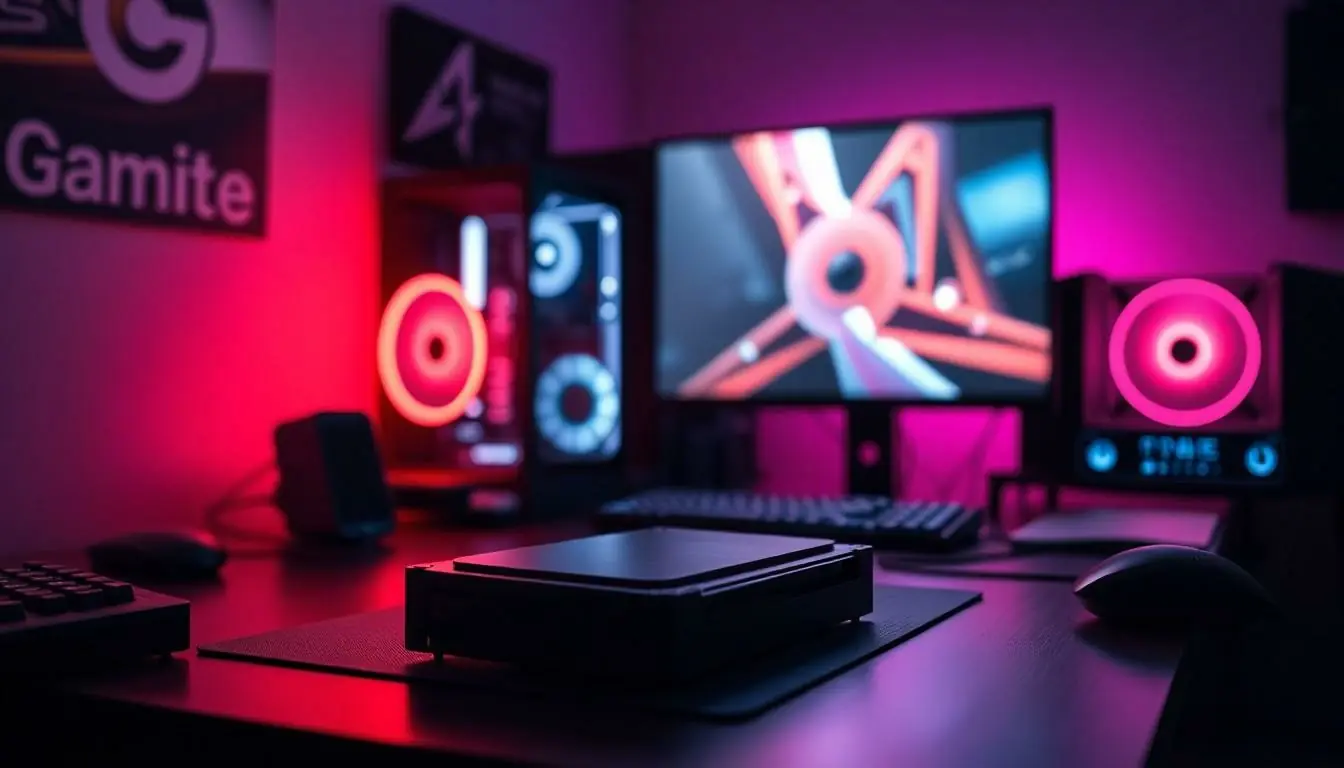In the world of gaming, a high-performance PC is only as good as its hard drive. Imagine loading into your favorite game only to be greeted by a spinning wheel of doom. Not exactly the thrilling adventure gamers crave, right? A solid hard drive can be the difference between epic victories and frustrating losses.
Table of Contents
ToggleOverview of Gaming PC Hard Drives
Gaming PC hard drives play a crucial role in overall system performance. Numerous types of hard drives exist, each catering to specific gaming needs. Solid State Drives (SSDs) stand out for their speed, providing quicker data access and reduced loading times. Traditional Hard Disk Drives (HDDs) offer larger storage capacities at lower prices, making them popular choices for gamers with extensive libraries.
Data transfer speeds significantly impact gameplay experience. SSDs can achieve speeds of up to 5000 MB/s, while HDDs typically range from 80 to 160 MB/s. Faster loading times not only enhance player immersion but also improve multitasking capabilities.
Durability and reliability also factor into hard drive selection. SSDs lack moving parts, making them less prone to mechanical failure and able to withstand shocks better than HDDs. For competitive gamers, data loss from drive failure may lead to interruptions that affect performance and rankings.
Storage capacity varies widely among hard drives. Common capacities for SSDs include 500 GB, 1 TB, and 2 TB options. HDDs can reach up to 18 TB or more, suitable for storing large game libraries and multimedia files. Gamers often pair both types of drives to utilize the speed of SSDs for active games while maintaining ample storage with HDDs.
Installation and upgrade processes are essential to consider. Many gaming PCs allow easy upgrades, giving users flexibility to enhance their systems. Ensuring compatibility with the motherboard and other components remains vital during the selection process.
Types of Gaming PC Hard Drives
Different types of hard drives suit varying gaming needs. Solid State Drives (SSDs) and Hard Disk Drives (HDDs) represent the main categories available, each offering distinct benefits.
Solid State Drives (SSDs)
SSDs utilize flash memory, resulting in significantly faster data access. Loading times decrease drastically, enhancing gaming experiences. Speeds can reach up to 5000 MB/s, allowing for quick game launches and seamless transitions between levels. The absence of moving parts contributes to improved durability, minimizing the risk of mechanical failure. Storage capacities generally range from 500 GB to 2 TB, making them ideal for gamers who prioritize performance over extensive storage. Many gamers favor SSDs for their ability to support high-speed processes.
Hard Disk Drives (HDDs)
HDDs rely on spinning disks for data storage, offering larger capacities at lower costs. Storage options can exceed 18 TB, accommodating extensive game libraries and media collections. Transfer speeds average between 80 and 160 MB/s, impacting loading times but providing ample space for users. Despite being slower, HDDs remain a popular choice for budget-conscious gamers. Additionally, they serve as supplementary storage solutions alongside SSDs, maximizing both performance and space effectively. Many enthusiasts opt for this combination to balance speed and capacity.
Performance Factors to Consider
Selecting the right hard drive significantly impacts gaming performance. Two key factors to analyze are speed and storage capacity.
Speed and Load Times
Speed influences how quickly games load and respond. SSDs deliver exceptional performance with data access speeds up to 5000 MB/s, drastically reducing load times. Quick access improves the gameplay experience, minimizing frustration during waiting periods. On the other hand, HDDs lag with speeds ranging between 80 and 160 MB/s, resulting in slower game launches and loading screens. Gamers prioritizing quick responsiveness choose SSDs for faster performance and smoother transitions.
Storage Capacity
Storage capacity determines how many games can be installed and accessed. SSDs typically offer capacities from 500 GB to 2 TB, catering to users focused on performance. Gamers with extensive libraries often opt for HDDs due to their larger capacities, often exceeding 18 TB. Lower prices make HDDs budget-friendly options, especially for storing multiple titles. Many gamers now combine both types, using SSDs for their most played titles while keeping larger game libraries on HDDs. This strategy balances performance and storage needs effectively.
Best Gaming PC Hard Drives on the Market
High-performance hard drives significantly enhance gaming experiences. Several top options exist in both SSD and HDD categories.
Top SSD Options
Samsung 970 EVO Plus excels with speeds up to 3500 MB/s, offering 500 GB to 2 TB storage capacities. Crucial P5 also delivers impressive performance at similar speed levels, emphasizing reliability. Western Digital Black SN850 combines large storage options and rapid access times, ensuring seamless gameplay. All of these SSDs provide gamers with low latency and improved load times, making them excellent choices for those prioritizing speed.
Recommended HDD Choices
Seagate Barracuda leads the way with capacities exceeding 18 TB, catering to gamers with extensive libraries. Western Digital Blue offers a solid balance between storage and price, with options typically around 6 TB. Toshiba X300 enhances performance further with its larger cache sizes and robust design. Each of these HDDs serves as a budget-friendly option for gamers needing ample storage while maintaining decent performance.
Maintaining Your Gaming PC Hard Drive
Proper maintenance of a gaming PC hard drive enhances longevity and performance. Regular tasks focus on cleaning, monitoring, and optimizing storage for seamless gaming experiences.
Cleaning the hard drive involves removing unnecessary files. Using software tools like CCleaner or built-in utilities helps eliminate temporary files, system caches, and old game data that consume valuable space.
Monitoring hard drive health proves vital for performance. Utilizing tools such as CrystalDiskInfo provides insights into the drive’s status and temperature. Paying attention to these metrics helps identify potential issues early.
Defragmenting hard drives belongs to traditional HDD maintenance, enhancing data access speed. Running built-in Windows tools or third-party software streamlines fragmented files. However, defragmentation is unnecessary for SSDs due to their different data storage patterns.
Regular backups ensure data safety. Implementing solutions like cloud services or external drives offers peace of mind. Scheduling automatic backups reduces the risk of losing game saves and essential files.
Performing firmware updates keeps the hard drive performing optimally. Checking manufacturer websites for the latest updates aids in avoiding compatibility and performance issues. Keeping the system and its components up to date reflects an essential maintenance practice.
Over time, gamers may consider upgrading storage options. Assessing the capacity and performance needs leads to informed decisions. Opting for additional SSDs or larger HDDs tailors the gaming experience to personal requirements.
Following these maintenance steps helps maximize performance and longevity of gaming PC hard drives. Prioritizing regular cleaning, monitoring, and upgrading leads to smoother and more enjoyable gameplay.
Conclusion
Choosing the right hard drive is crucial for any gaming PC. Gamers need to balance speed and storage capacity to ensure an optimal experience. Solid State Drives offer lightning-fast loading times that can enhance gameplay, while traditional Hard Disk Drives provide ample space for large game libraries at a more affordable price.
By understanding the strengths of each type and maintaining their drives, gamers can significantly improve their system’s performance. Regular maintenance tasks and thoughtful upgrades can lead to a smoother gaming experience, allowing players to fully immerse themselves in their favorite titles. With the right hard drive strategy, gaming enthusiasts can enjoy both speed and storage without compromise.



